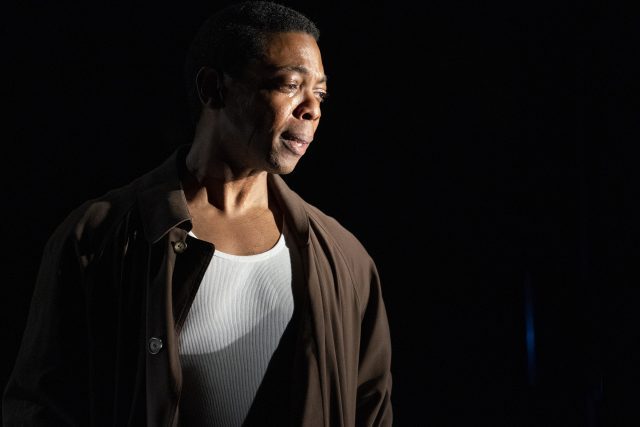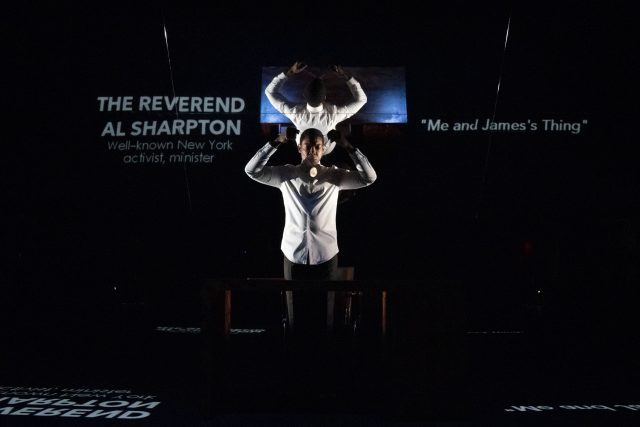
Michael Benjamin Washington plays multiple roles in Signature revival of Fires in the Mirror (photo © 2019 Joan Marcus)
The Pershing Square Signature Center
The Romulus Linney Courtyard Theatre
480 West 42nd St. between Tenth & Eleventh Aves.
Tuesday – Sunday through December 15, $40 – $75
212-244-7529
www.signaturetheatre.org
On August 19, 1991, seven-year-old Gavin Cato was struck and killed by a car driven by Yosef Lifsh in Crown Heights, Brooklyn. The next day, riots broke out that pitted the black community against Orthodox Jews in a bloody battle that resulted in the murder of Yankel Rosenbaum, a visiting student from Australia. A year later, Baltimore-born actress and playwright Anna Deavere Smith staged Fires in the Mirror at the Public, a one-person show that explored the incendiary situation from multiple angles, consisting of verbatim dialogue taken from a series of interviews Smith conducted with more than one hundred people. With race still such a heated topic more than a quarter century later, the time is ripe for a revival; as part of her residency at the Signature, Smith has brought back the play, passing the torch to Michael Benjamin Washington, who will be performing the show, which opened tonight at the Romulus Linney Courtyard Theatre, through December 15. Washington is heart-wrenching as he spends 110 uninterrupted minutes switching among more than two dozen men and women as racial issues, biases, anti-Semitism, and social justice take center stage and the events of August 19-21, 1991, unfold.

Michael Benjamin Washington portrays Al Sharpton and many others with ties to the Crown Heights riots in Anna Deavere Smith’s Fires in the Mirror (photo © 2019 Joan Marcus)
Washington portrays such public figures as writer Ntozake Shange, theater director George C. Wolfe, the Reverend Al Sharpton, activists Angela Davis and Sonny Carson, and author Letty Cottin Pogrebin as well as various rabbis and ministers, Crown Heights residents, and relatives of both Cato and Rosenbaum. He makes subtle costume changes to indicate each character, adding a bowtie or a necklace, putting on a jacket, or taking off a shirt. (The costumes are by Dede M. Ayite.) Similarly understated are his shifts in accent to identify different individual monologues, all of which sing with their own poetry. Each character is introduced by Hannah Wasileski’s projections, which bounce off the floor and onto the long mirror at the back of the stage. Each interview is titled: an anonymous Lubavitcher woman’s segment is called “Static” because she is trying to get a non-Jew to turn off her radio on Shabbos; Wolfe’s is “101 Dalmatians” because as a child he could not go to the movies to see the animated film because the theater was segregated; Rivkah Siegal’s is “Wigs” because she describes the rules for Orthodox wives’ hairstyles; and an anonymous young man’s is “Bad Boy” since he doesn’t believe that sixteen-year-old Lemrick Nelson could have killed Yankel Rosenbaum because Nelson was an athlete and thus cannot be bad.
Accusations are made, prejudices are revealed (on all sides), the mayor and the police are blamed, and belief systems are challenged and defended. In addition to tables, cabinets, and chairs, Arnulfo Maldonado’s set is backed by a large mirror in which the audience can see itself, implicating all of us in the conflict. Fluidly directed by Saheem Ali (Kill Move Paradise, Passage) to prevent narrative gaps, Fires in the Mirror offers a provocative look at who we were then and who we are now, anchored by a bravura performance by Washington (The Boys in the Band, La Cage aux Folles). Among her other one-person shows, Smith documented and dramatized the 1992 LA riots in Twilight: Los Angeles, 1992 (which the Signature is remounting in spring 2020), took on the health-care crisis in Let Me Down Easy, and examined the school-to-prison pipeline in Notes from the Field. As this revival of Fires in the Mirror reveals yet again, Smith is a master at verbatim theater and at taking the nation’s temperature, while Ali and Washington prove the timeless universality of Smith’s work.